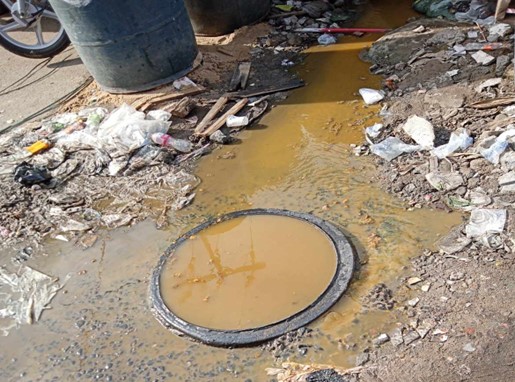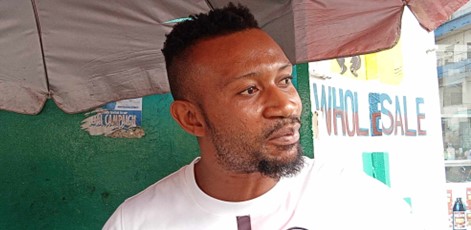MONROVIA, Montserrado – Many residents and business owners of Central Monrovia are raising concerns about the potential spread of diseases and contamination of water sources associated with sewage leaking into the city’s streets. They want the Liberia Water and Sewer Corporation to find a permanent solution to the problem.
At the Gurley and Benson Streets intersection, the Lulu Pharmacy faces an open manhole overflowing with raw sewage. Martha Koffeh, a pharmacy dispenser there, has lost faith that LWSC can solve the problem.
Koffeh said sales at the pharmacy have dropped significantly, as customers tend to avoid walking near that area due to the unbearable stench.
“I am really wondering why LWSC will be in the know of this open manhole and leaky sewage but deliberately refusing to come to our aid,” she said.
“Perhaps they want to hear that people are in the streets protesting for sewage cleaning and public health measures before they can do their work.”
Not far from LULU Pharmacy on Gurley Street sits Izw Henee, a phone repairer. He described the situation of sewage leaking onto the streets as unbearable. Although he acknowledged that LWSC has attempted to clean the mess in the past, such efforts are usually temporary solutions; it takes no time for the streets to get polluted again.
Henee said LWSC has not cleaned the area for the past three months despite the many calls. This has reduced his income, he noted.
“This place is noted for the repairing of phones and other electronic devices,” he said. “When people come and begin to smell the stink odor from the sewage, they take their materials from us in the name of the place is not safe for their health.”
He called for a long-term solution from LWSC, as he believed that sending sewage trucks every few months to suck out the raw sewage is not a sustainable solution.
Izw Henee, a phone repairer on Gurley Street. Photo: George K. Momo
Other incidents of exposed sewage were spotted on Newport Street, Carey Street, Water Street, and Buzzy Quarter, although the Buzzy Quarter sewage overflow was recently fixed. However, several people working in Buzzy Quarter told The Bush Chicken that such fixes were only temporary.
Aaron Kennedy, a seller of ceramic dishes, and Josephine Williams, who sells dry goods, complained that LWSC had abandoned the sewage leaking on Water Street, a stone’s throw from LWSC’s office. During the rainy season, the sewage mixes with the rainwater and spreads around the Waterside Market. Kennedy and Williams believe that the unsafe public health conditions created by the open sewage are responsible for many Waterside Market traders being frequently diagnosed with cholera and typhoid.
“Just as you are seeing this place with those running feces water, we sit here to sell, eat, and lecture,” Kennedy said. “We are living by God’s mercy, but we pray that this [age-old] situation will one day be handled [to] see a long-lasting end.”

Water Street leaking sewage Photo: George K. Momo
Nimpson Todd, head of Public Affairs at LWSC, told The Bush Chicken via phone that the corporation was working to clean sewage across the city. He asked the public to remain patient, although he declined to provide a specific time when the situation would be permanently resolved.
“In fact, Gurley and Benson Streets intersection, Water Street, Buzzy Quarter, 12th Street, and other areas are considered hot spots for the LWSC technical team,” he said. “We are aware of them, and I can assure you that they will be worked on in the soonest possible time to bring relief to our people.”
Todd said the technical team had now decided to begin working on Sundays to make it easier to work on the overflowing sewage. During the middle of the week, when streets are flooded with people and businesses are open, LWSC technicians have limited access to these areas.
Todd said much of Liberia’s sewage system is clogged with used tires, containers, and other foreign objects. This necessitates moving sewage trucks to various manholes to extract the raw sewage. When this is not done frequently enough, the sewage overflows onto the streets.
A 2019 Environmental and Social Impact Assessment report for the Liberia Urban Water Supply Project described the city’s sewage system as grim. Monrovia has a network of sewer pipes, nine lift stations for transporting water from lower to higher elevations, and the “non-functional” Fiamah Sewage Treatment Plant.
The report notes that LWSC sends sewage vacuum trucks around the city to suck up raw sewage for depositing at the Fiamah plant.
“The facility is, however, dilapidated and non-operational and has been so for the last 20 years or more,” the report said. “Raw sewage, including sludge, is simply being discharged on land and the wastewater left to either flow overland or infiltrate through the soil.”
Featured photo by George K. Momo


